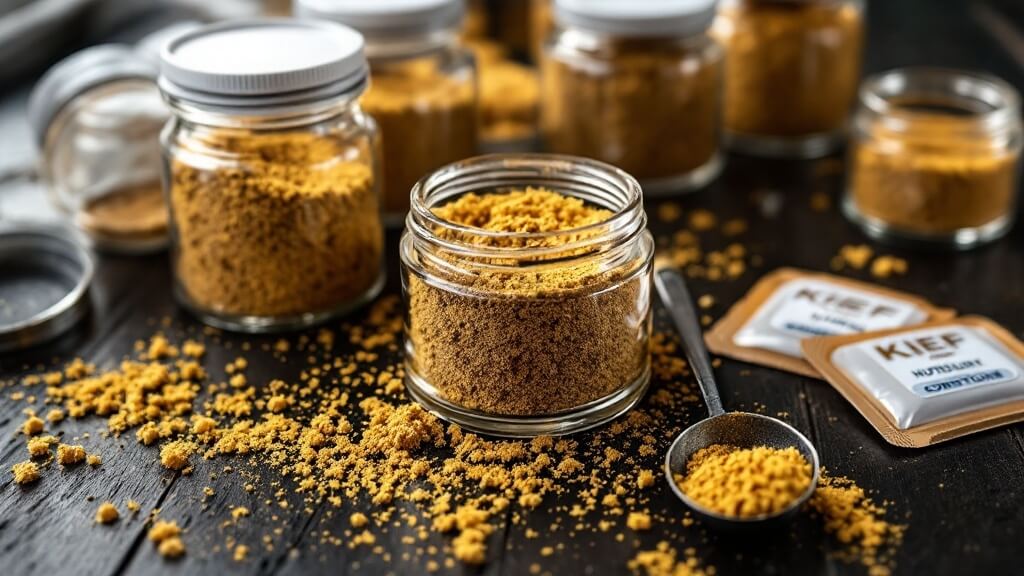THCA is the non-psychoactive precursor compound found in raw cannabis that converts to THC when heated above 220°F (104°C), a process called decarboxylation. While THCA cannot effectively bind to CB1 receptors and won’t cause intoxication, it still offers potential anti-inflammatory and neuroprotective benefits. THC, conversely, produces the characteristic cannabis “high” and varied therapeutic effects. The distinction matters for consumers seeking specific benefits and steering through legal considerations across different jurisdictions.

While cannabis enthusiasts often discuss THC as the primary compound in marijuana, many remain unaware of its precursor, THCA (tetrahydrocannabinolic acid), which exists abundantly in raw cannabis plants. This acid form contains an extra carboxyl group (COOH) that fundamentally alters its properties and interaction with the human body. The molecular structure of THCA prevents it from binding effectively to CB1 receptors in the brain, resulting in its non-psychoactive nature.
The transformation from THCA to THC occurs through a process called decarboxylation, where the carboxyl group detaches from the molecule when exposed to heat (typically above 220°F/104°C), ultraviolet light, or extended periods of time. This chemical conversion explains why consuming raw cannabis doesn’t produce intoxicating effects, while smoking, vaping, or baking with cannabis does. The decarboxylation process effectively activates the psychoactive potential of cannabis material. Unlike THC, consuming THCA in its raw form provides potential medicinal benefits without causing the euphoric high associated with cannabis.
Decarboxylation transforms raw cannabis into its psychoactive form, releasing the mind-altering potential locked within the plant’s chemistry.
Freshly harvested and properly cured cannabis flowers mainly contain THCA rather than THC. Laboratory tests often report potential THC levels, which represent the total THC content if all THCA were converted through decarboxylation. Cannabis product labels may cause confusion by listing THC percentages that actually represent this theoretical maximum rather than the active THC present in the product’s current state.
The biological activities of these compounds differ greatly beyond their psychoactivity. THCA exhibits promising anti-inflammatory, neuroprotective, and antiemetic properties without inducing cognitive impairment, indicating its potential as a therapeutic agent. THC, conversely, produces the characteristic cannabis “high” along with potential therapeutic benefits including pain relief, appetite stimulation, and nausea reduction, though it may carry risks of dependency and cognitive effects with chronic use. Regular THC consumption can lead to impaired motor skills that significantly increase the risk of accidents, especially when driving.
Legal distinctions between THCA and THC vary across jurisdictions, with some regulatory frameworks acknowledging the difference between the non-intoxicating precursor and its psychoactive derivative. This distinction creates important considerations for cannabis consumers, particularly those seeking therapeutic benefits without intoxication.
Medical patients interested in THCA’s potential health properties often turn to raw cannabis juicing or specialized THCA-rich products that haven’t undergone heating processes.
Understanding the relationship between THCA and THC provides essential context for cannabis consumers traversing the increasingly diverse marketplace of cannabis products, helping individuals make informed choices aligned with their desired effects and legal considerations.
Frequently Asked Questions
Is THCA Psychoactive Before Decarboxylation?
THCA is not psychoactive before decarboxylation.
In its raw state, THCA contains an additional carboxyl group (COOH) in its molecular structure, which prevents it from properly binding to CB1 receptors in the brain.
This larger molecular configuration makes it impossible for THCA to produce the euphoric “high” associated with cannabis consumption.
Only when THCA undergoes decarboxylation through heat, light, or time does it convert to THC, the compound responsible for cannabis’s intoxicating effects.
What Medical Conditions Can THCA Potentially Treat?
Research suggests THCA may potentially treat several medical conditions through its therapeutic properties.
Studies indicate it could benefit inflammatory disorders like arthritis and inflammatory bowel disease by reducing inflammation markers.
THCA shows promise for neurodegenerative conditions including Parkinson’s and Alzheimer’s through its neuroprotective effects.
Additionally, it demonstrates potential in managing chemotherapy-induced nausea and vomiting.
The compound may also help alleviate neuropathic pain, possibly serving as an alternative to traditional pain medications due to its non-psychoactive profile.
How Is THCA Extracted From the Cannabis Plant?
THCA is extracted from cannabis through several methods.
Raw plant processing involves harvesting at peak ripeness and maintaining cold temperatures to prevent decarboxylation.
Solvent-based extraction utilizes ethanol, butane, or CO2 at low temperatures to preserve THCA’s carboxyl group.
Solventless techniques include ice water extraction, mechanical separation, and rosin pressing.
Final purification often employs crystallization or chromatography to isolate THCA from other compounds, resulting in products containing 90-99% THCA depending on refinement level.
Can THCA Be Detected in Drug Tests?
Standard drug tests typically detect THC metabolites rather than THCA directly.
However, THCA can convert to THC through decarboxylation, which occurs with heat, light exposure, or even during testing procedures. This conversion means consuming THCA products may lead to positive test results.
While specialized laboratory techniques like LC-MS/MS can differentiate between THCA and THC, most employment and roadside screenings lack this capability.
The risk of detection increases if THCA is consumed in heated form.
Are There Legal Differences Between THCA and THC Products?
Yes, significant legal differences exist between THCA and THC products.
Under federal law, THCA derived from hemp with less than 0.3% delta-9 THC is not classified as a controlled substance, while THC remains a Schedule I substance.
State regulations vary widely, with some jurisdictions distinguishing between the compounds and others restricting all cannabis-derived molecules.
The legal status changes when THCA converts to THC through heating, potentially making a previously legal product illegal depending on resulting THC concentration.








